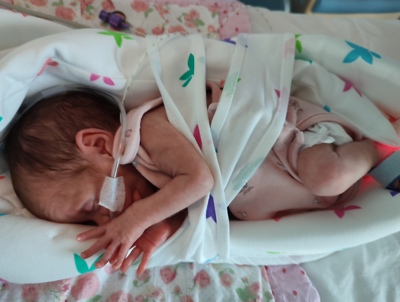- Date awarded: June 2022
- Awarded value: £3,148
- Fund: Special Baby Care Unit
- Location: Neonatal Unit, Victoria Hospital

The purchase of a range of positioning aids to help in the care of premature babies within Fife’s specialist Neonatal Unit based in the Victoria Hospital, Kirkcaldy, was funded by Fife Health Charity.
The aids purchased with the support of Fife Health Charity provide therapeutic and optimal positioning for premature babies being cared for in the Neonatal Unit at the Victoria Hospital. The specialist positioning aids are designed to promote correct joint alignment and symmetry, supporting neuromuscular development and improving the babies’ comfort.
Very preterm babies who are not adequately supported in their positioning may experience long term detrimental effects to their posture, movement and feeding. Staff in the specialist unit found that trying to use sheets and other similar resources to create boundaries and positioning aids within the incubators and cots proved inadequate.
Caring for preterm babies, who can be born from as young as 23/24 weeks gestation, and helping them to thrive brings its own unique clinical challenges. A priority for the Neonatal Unit’s specialist staff is to ensure the babies are correctly positioned in their incubators and cots to support growth and musculoskeletal development, reduce stress and enhance comfort.
The range of positioning aids purchased as a result of charity funding includes nests in different sizes to suit the different gestational ages of the babies cared for in the unit, specially designed multi-purpose frog-shaped bean bags that support the baby’s head and body, and prone boards.
The Difference Our Funding is Making
The introduction of the positioning aids has brought significant benefits to the unit’s young patients, as Caroline Macfarlane, Clinical Educator at the Neonatal Unit, reports. “The Freddy frog is a multipurpose positioning aid. We can use it around the head, neck or hips. We can also use it to keep babies head in the midline, which can be important for blood flow in very preterm babies, or it could even be used as an extra comforting hand during procedures.”
Using a nest helps with postural development. The boundaries within the nest encourage the baby to adopt a flexed posture, which helps with musculoskeletal development and helps the baby to have hands near their face and mouth, so they can explore and self-soothe. Nests also help prevent any unnecessary tiring large movements, which use up energy and calories needed for growth.
“Overall the new positioning aids are increasing babies’ comfort,” Caroline continues. “When babies are settled and comfortable, we see more stability in heart rate and breathing as well as better quality sleep, which is really important for growth and development.
“The positioning aids are designed for babies who are being closely monitored in a neonatal unit only and we always recommend that parents follow safer sleep advice at home, which is that babies should be placed on their back to sleep in a cot that is clear of nests, towels or bumpers or toys.”
The aids have also brought wider benefits within the unit.
“The staff really like being able to use the positioning aids,” adds Caroline. “We all gain enormous satisfaction from seeing that the baby looks more comfortable and settled, and it’s the same for the parents. So, in a way, we all feel more settled!”
Photo caption - Oaklei Jennings who was born at 26 weeks gestation and weighed 900g, is 32 weeks gestation in the featured photo, which appears with the approval of Oaklei’s mother.


